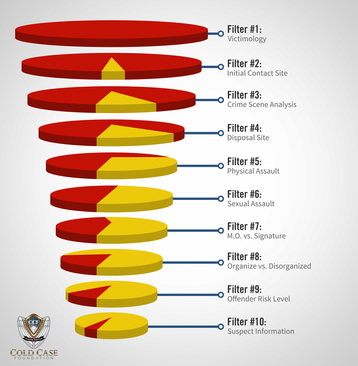Filter #1 Victimology
Crime is not a singular event.
It is a culmination of feelings, emotions, actions, and opportunity. Such a complex occurrence must be viewed multi-dimensionally. For this purpose, Profiling maximizes a methodical approach including 10 Filters. If done thoroughly, an investigator will immediately determine the "probability" of the nature and level of emotional relationship between the Victim and Offender, and whether the Offender was known by the Victim.
In many cases, if there is enough presence of behavior, the nature of the relationship will emerge, e.g. casual contact to intimate knowledge. And this of course will help an investigator to focus on the social circles of potential suspects.
Through the CCF website, you can explore the comprehensive filters beginning with Filter #1: Victimology.
It is a culmination of feelings, emotions, actions, and opportunity. Such a complex occurrence must be viewed multi-dimensionally. For this purpose, Profiling maximizes a methodical approach including 10 Filters. If done thoroughly, an investigator will immediately determine the "probability" of the nature and level of emotional relationship between the Victim and Offender, and whether the Offender was known by the Victim.
In many cases, if there is enough presence of behavior, the nature of the relationship will emerge, e.g. casual contact to intimate knowledge. And this of course will help an investigator to focus on the social circles of potential suspects.
Through the CCF website, you can explore the comprehensive filters beginning with Filter #1: Victimology.
|
10 Profiling Filters
|
“When you eliminate the impossible, whatever remains,
however improbable, must be the truth.” - A. Conan Doyle, The Sign of Four - Sherlock Holmes 1- THE CAUTION
The ultimate aim of an investigation is to solve the mystery, answer the questions and reveal the truth. Revelation of the truth, is the primary and critical foundation to final resolution. For without the truth, the indisputable facts, a conclusion will never be reached to precisely solve the mystery. Otherwise, hasty conclusions may be drawn and unless they are based on accurate and reliable data, the answer remains open to conjecture, fallibility and false claims.
The investigator must be committed to the discovery of the truth first, which will then lead to a successful and accurate judgment. We err by prematurely developing our theory before first gathering all of the sufficient data. This can be compared to a physician who begins to prescribe medication and treatment without first gathering the necessary information to determine an accurate diagnosis of the problem. Imagine a patient who complains of headaches to his doctor. The doctor impulsively prescribes a new set of glasses for impaired vision, only to later discover that the patient is suffering from a brain tumor. There have been a number of accounts revealed of innocent people who have been falsely accused, tried, convicted and sentenced. When additional evidence was discovered, they were subsequently released after several years of confinement. These errors reek of the highest injustice and unnecessary folly in the criminal justice system. |
Among the most serious follies of an investigator is to develop theory before acquiring sufficient data. Gathering accurate, articulable data and infallible facts is the keystone to developing a reasonable hypothesis which will lead the investigation to a successful, certain and reliable conclusion. Otherwise, we stand the risk of adjusting the facts to satisfy our theory (ego) which can lead to the most serious of consequences, including false accusation and conviction of an innocent person. Another misfortune is that a case may remain unsolved because of the failure to first accurately diagnose before prescribing on impulse and prejudices.
Sherlock Holmes stated this principle well in Scandal in Bohemia:
Sherlock Holmes stated this principle well in Scandal in Bohemia:
“I have no data yet. It is a capital mistake to theorize before one has data.
Insensibly one begins to twist the facts to suit the theories, instead of the theories to suit the facts.”
- Sherlock Holmes
Insensibly one begins to twist the facts to suit the theories, instead of the theories to suit the facts.”
- Sherlock Holmes
A scientist employs an exhaustive and comprehensive methodology in his search for truth and an explanation of the natural mysteries of life. Like the dedicated scientist, the conscientious investigator is committed to revealing accurately the phenomenon of criminal behavior. He therefore must apply a procedure to ensure his best and most objective effort in mining for the truth.
Complex investigations are often burdened and overwhelmed by an avalanche of information and investigative leads. The labyrinth of interlocking data compels the investigator to conduct the investigation in an orderly and disciplined fashion. A logical, sequential approach is best, or the effort to digest this massive dose of information is akin to taking a drink of water from a fire hydrant. Order must be achieved or chaos reigns. Chaos never helped to solve a crime. An empirical investigation is achieved through a systematic, comprehensive and thorough strategy. The more bizarre or complicated the crime, the more orderly the approach required to successfully find the key to unravel and decipher the puzzle.
Complex investigations are often burdened and overwhelmed by an avalanche of information and investigative leads. The labyrinth of interlocking data compels the investigator to conduct the investigation in an orderly and disciplined fashion. A logical, sequential approach is best, or the effort to digest this massive dose of information is akin to taking a drink of water from a fire hydrant. Order must be achieved or chaos reigns. Chaos never helped to solve a crime. An empirical investigation is achieved through a systematic, comprehensive and thorough strategy. The more bizarre or complicated the crime, the more orderly the approach required to successfully find the key to unravel and decipher the puzzle.
“He who asks the questions cannot avoid the answers.”
Cameroonian Proverb
Cameroonian Proverb

